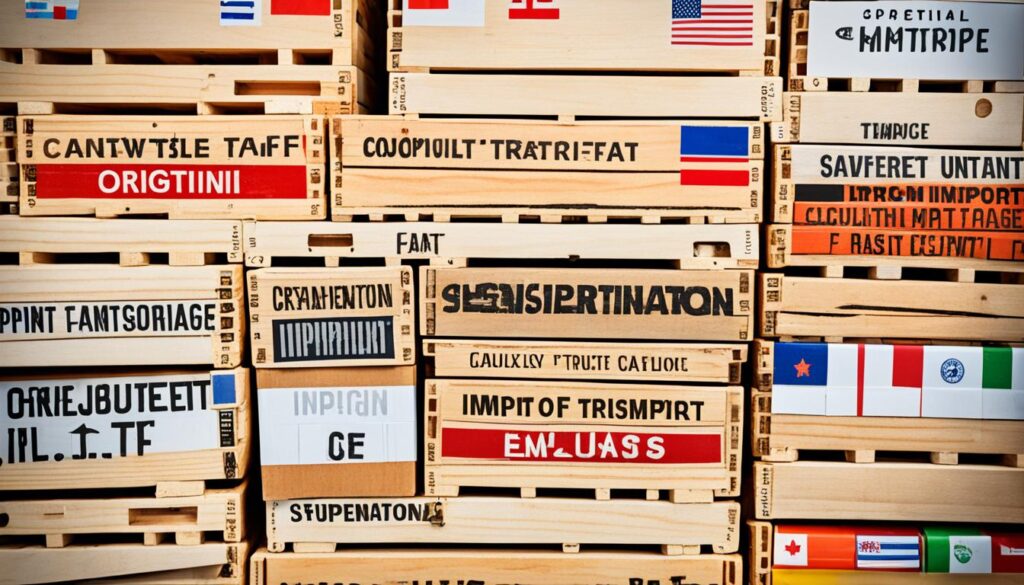Figuring out if you can deduct import tariffs from your taxes is complex. Import tariffs are like taxes on goods you bring from other countries to the U.S. They depend on the value, type, and where the items come from. These tariffs help control what comes into the U.S. to protect its economy. Some goods, such as American Goods Returned (AGR), might not need to pay tariffs. But, getting it wrong could be costly and lead to problems with the law. Always be sure of what you are importing. Seek advice from experts or check trusted sources, like Intuit forums or official government sites. They can help you understand how to handle tax deductions for import tariffs and customs duties.
Key Takeaways
- Import tariffs are taxes on goods entering the U.S.
- Declarations are mandatory for imported items.
- Some items like American Goods Returned (AGR) might be exempt.
- Avoid misunderstandings to prevent unnecessary payments or legal issues.
- Consult tax experts for up-to-date guidance.
Understanding Import Tariffs
Import tariffs are taxes on goods moving between countries. They protect local businesses and raise money for the government. Knowing about these tariffs helps you understand global trade better.

What Are Import Tariffs?
Import tariffs help a country’s economy by limiting certain imports. For example, if you import clothes or cars, you might pay these taxes. This system allows local companies to compete fairly. But, setting these tariffs involves detailed trade and economic strategies.
How Are Import Tariffs Calculated?
The way import tariffs are calculated varies. Generally, they’re a percentage of the goods’ value. A detailed schedule, the Harmonized Tariff Schedule (HTS), assigns each product a code and tax rate. This system ensures the right taxes are charged on imports.
Examples of Goods Subject to Import Tariffs
Many items can have import tariffs placed on them. From phones and computers to luxury cars, almost everything has a tariff. Some examples include:
- Smartphones and laptops often have high tariffs based on their value.
- Alcohol and tobacco face tariffs plus limits on quantities you can import, affecting what you pay.
- Luxury cars and sports cars can be expensive to import due to their high tariff rates.
It’s key to know about the HTS codes. This knowledge helps you figure out what you owe in taxes. It also ensures you follow all trade regulations.
Having this information will make dealing with import regulations easier. You’ll be better at managing costs. Plus, you might be able to save money by using tax deductions smartly.
Are Import Tariffs Tax Deductible?
The question of getting tax breaks on import tariffs is common for importers. Whether you can deduct these fees depends on if they’re for personal or business use. Now, we’ll look closely to explain what’s deductible and what’s not.
Business vs. Personal Deductions
For those shopping overseas, sorry, the fees aren’t deductible for personal use. But, if you own a business and import goods for selling or using in your operations, you’re in a better position.
Companies can consider deductible import fees in their operation costs. This method can lower your taxable income. The IRS allows this deduction for goods meant for business purposes. So it’s a win for businesses thinking about adding import tariffs to tax write-offs in their annual taxes.
Case Study: Business Import Tariff Deductions
Picture a fashion retailer bringing in products from Europe. They can deduct the import taxes paid from their cost of goods sold. For this deduction, detailed records are a must. Keeping thorough documentation helps when justifying your import taxes tax write-off.
Remember, there’s an annual deduction limit for state and local taxes. It’s capped at $10,000 for individuals. This limit is crucial for big importers. They might quickly reach it. So, careful planning and advice from experts are key to maximizing deductions correctly.
Conclusion
Figuring out import tariffs and tax deductions can be tricky. It’s not an exciting task. But, it’s simple: Import tariffs are deductible if used for business, not personal reasons.
Importing for your personal use, like diamonds for a collection, won’t get you tax deductions. This rule applies no matter how cool your personal imports are. But, in business, you can deduct these tariffs from your taxes as part of your operations. It’s important to keep track of your imports with detailed records.
Understanding HTS codes and staying up-to-date on tax law changes is smart. A tax professional’s help is advised. They can help you follow the rules and maybe find more deductions.
So, can you deduct import tariffs on your taxes? It depends on if the imports are personal or for business. By keeping good records and getting advice, handling your import taxes better is possible. Being informed and acting proactively can really help you save on taxes.








